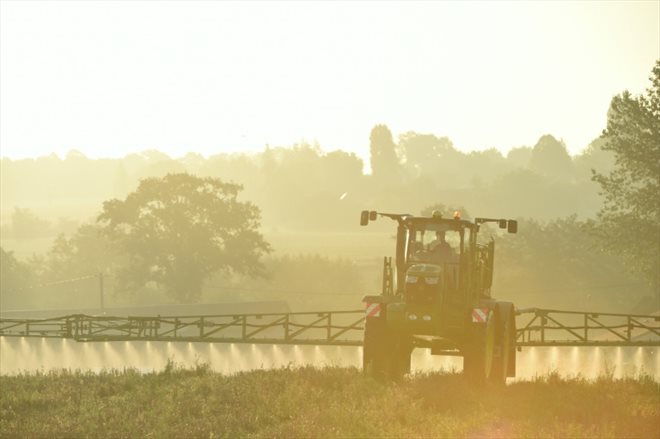A farmer spreads herbicide on his farm in Sarthe, in 2019 (AFP/Archives/JEAN-FRANCOIS MONIER)
Bayer, owner of Monsanto, announced to AFP on Wednesday that it intended to appeal against a conviction by an American jury to pay more than 300 million dollars to a plaintiff who blamed his cancer on the controversial weedkiller Roundup.
Jurors in the California court in San Diego on Tuesday evening awarded $7 million in compensation and $325 million in punitive damages to plaintiff Michael Dennis, a 57-year-old surveyor who was diagnosed with non-Hodgkin’s lymphoma after using glyphosate-based herbicide for more than 30 years.
The German group told AFP that it will appeal this decision, which it does not “understand”, according to a company spokesperson.
“We are convinced that this decision will be corrected through legal action and that at least the excessive amounts of damages, which are in fact unconstitutional, will be reduced,” said this source.
On the Frankfurt Stock Exchange, Bayer shares lost 0.95% in the afternoon, accentuating a decline of 16% accumulated since January.
This legal setback is the third in American courts in the past month, appearing to reverse a cycle after a series of nine older judgments in favor of the company.
The German group, which acquired Monsanto in 2018 for $63 billion, has since found itself entangled in multiple procedures related to weedkiller in the United States.
Some 113,000 of the 160,000 lawsuits filed against Bayer have been concluded, according to the group, which has set aside $16 billion to cover the legal risk linked to Roundup.
Bayer continues to assure that its products are not carcinogenic.
Glyphosate, the active substance in several herbicides – including Monsanto’s Roundup, widely used around the world – was classified in 2015 as a “probable carcinogen” by the International Agency for Research on Cancer of the World Health Organization.
Conversely, in July, the European Food Safety Authority (EFSA) said it had not identified any “critical areas of concern” in humans, animals and the environment that would prevent authorization of the herbicide, while recognizing a lack of data.
The member states of the European Union must vote again in the first half of November on the Commission’s proposal to extend the authorization of glyphosate for ten years.
In October, the qualified majority required to validate the text was not reached due to the abstention of France and Germany.
In the event of another blockage in November, the European Commission will have the last word.
© 2023 AFP
Did you like this article ? Share it with your friends using the buttons below.




